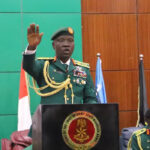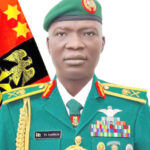President Muhammadu Buhari on Saturday in Dead Sea, Jordan, urged world leaders to work towards narrowing gaps in social and economic opportunities for citizens as panacea to rising conflicts across the globe.
A statement by Mr Femi Adesina, the President’s Special Adviser on Media and Publicity, in Abuja on Saturday, said President Buhari stated this at the World Economic Forum on Middle East and North Africa.
The President, who honoured an invitation by King Abdullah II bin Al-Hussein of Jordan, attributed the Boko Haram terrorism in Nigeria to lack of socio-economic inclusion.
According to President Buhari, rising opportunities of prosperity for some people while others struggle to survive triggers tension and conflict.
He said: “It is at this point that we must ask ourselves how we, as a region, got to this point. The answer, at least in the case of Nigeria, is the lack of social and economic inclusion.
“As Nigeria celebrated being the largest economy in Africa and one of the fastest growing economies in the world, Nigerians were migrating in droves through harsh desert conditions and across treacherous seas to seek what they believe would be a better life in Europe.
“I strongly believe that lack of social and economic inclusion was the root cause of many challenges we are experiencing.’’
President Buhari said the changes taking place across the world in technology, population, migration, trade and geo-politics had been yielding both positive and negative results in different parts of the world.
He, therefore, called for more collaboration across borders to alter tides of frustrations that fuel conflict.
“It is my view, that no region of the world has felt the full impact of these dramatic shifts and shocks like the Middle East and Africa–North and Sub-Sahara.
“On one hand, our region is blessed with a very young, vibrant, enterprising and dynamic population. We also have valuable natural resources that are the envy of many nations.
“These assets and endowments contributed to our region experiencing some of the highest economic growth rates in the world.
“On the other hand, however, we have also been hosts to some of the deadliest conflicts in recent history.
“The deaths, damages and destruction caused by terrorist groups such as Al Qaeda, ISIS and Boko Haram over the last 10 years will take decades to repair,’’ he added.
President Buhari said terrorism around the world, including Boko Haram, had been significantly degraded, stressing that the insurgents no longer control any territory in Nigeria but the country had been left with the task of rebuilding.
“In this digital age where physical borders no longer exist to protect even the most secured nations, the only way to overcome predatory and divisionary forces is for all well-meaning nations to work together for the greater good of mankind.
“Simply put, cooperation amongst sovereign nations is no longer a choice. It is an absolute necessity,’’ the President said.
He told the gathering of leaders, entrepreneurs and economic experts that “Nigeria’s population is 190 million, and by 2050, it is estimated to hit 390 million, making it the third most populous country in the world.’’
According to him, he spent the last four years tackling security issues in the country and implementing policies that make the economy more inclusive.
“We are extremely grateful to the many countries that stood with Nigeria to confront this global scourge and in particular, the Kingdom of Jordan under the leadership of His Majesty, the King.
“Furthermore, our economic diversification and social inclusion policies are also yielding positive results.
“Our country has now returned to the path of growth. We are making gains in the ease of doing business indices,’’ he added.
The President said the agriculture sector in Nigeria was driving government’s efforts to diversify the economy.
He added that “in the spirit of “Building New Platforms of Cooperation’, we partnered with the Kingdom of Morocco to domesticate fertilizer production in Nigeria and revive over two million tons of abandoned fertilizer blending plant capacity.
“The outcome is we created tens of thousands of jobs in agriculture, logistics, manufacturing and retail sectors.’’
He said Nigeria had achieved moderate and inclusive growth in four years.
President Buhari said Africa and the Middle East must focus on policies that deliver shared economic prosperity for all citizens, adding that more could be done on trade and investments.
“Opportunities exist in key job creating sectors such as Agriculture, Health, Tourism, ICT, Infrastructure as well as Textile and Garment industry, to mention a few.
“Our new, inclusive and diversified Nigeria is definitely open for business. Our population, resources, policies and programmes make it the most attractive investment destination in Africa,’’ he said.
In his welcoming remarks, King Abdullah II bin Al-Hussein of Jordan, said inclusive growth would be of benefit to the entire world, especially “when it creates enabling environment for youths and women.’’
The king said opportunities must be expanded fast, while noting that “the challenges we face are not only problems to be solved rather they are opportunities for collaboration.’’
The UN Secretary General Secretary-General António Guterres, said the world would be better off with stronger collaboration.
He commended Jordan for playing a historical role in restoring peace in the Middle East, especially between Israel and Palestine.
The founder and Executive Chairman of the World Economic Forum, Prof. Klaus Schwab, who congratulated President Buhari for his re-election for a second term, said discussions at the forum would focus on new ideas, entrepreneurship, innovation, environment, peace and reconciliation.(NAN)
 Join Daily Trust WhatsApp Community For Quick Access To News and Happenings Around You.
Join Daily Trust WhatsApp Community For Quick Access To News and Happenings Around You.


